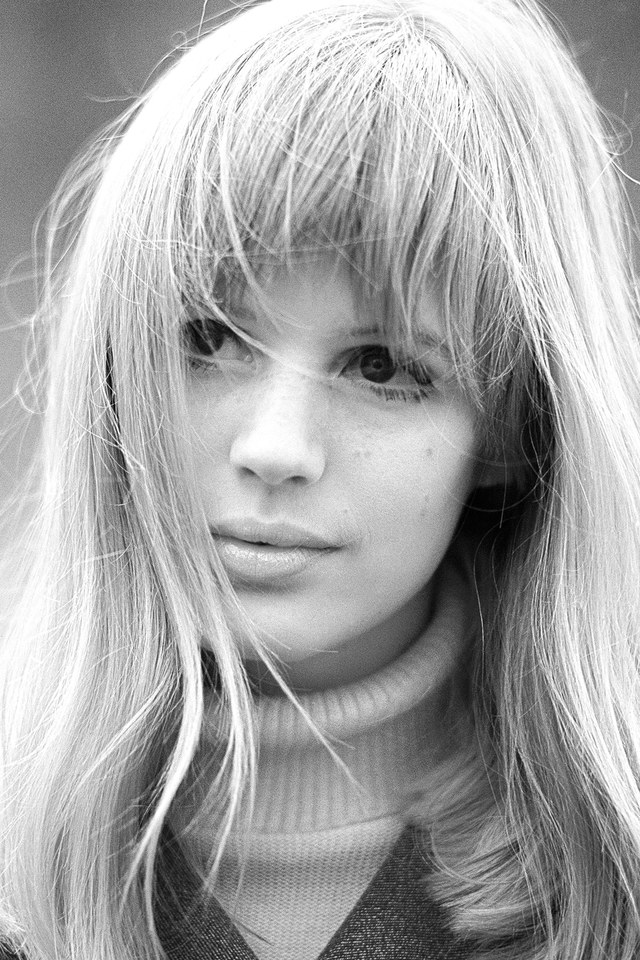

Queer Places:
Hanover Terrace Mews, London NW1 4SH, UK
27-50 Marylebone Rd, London NW1 5JR,
UK
 Marianne
Evelyn Gabriel Faithfull (born 29 December 1946) is an English singer,
songwriter and actress. She achieved popularity in the 1960s with the release
of her hit single "As Tears Go By" and became one of the lead female artists
during the British Invasion in the United States. In 1994 she published her
autobiography, entitled Faithfull, in which she discussed her life,
career, drug addictions, and bisexuality. "My mother was a ballet and cabaret
dancer in Weimar-era Berlin. She was bisexual, too. I was a sexual person, and
I was also on drugs, which did help me to cut down my inhibitions. I was able
to do things on drugs, like be with girls, that I would not have been able to
do if I were completely straight. The acid was wonderful. I believed it was
there to open my mind, so I took it very seriously."
Marianne
Evelyn Gabriel Faithfull (born 29 December 1946) is an English singer,
songwriter and actress. She achieved popularity in the 1960s with the release
of her hit single "As Tears Go By" and became one of the lead female artists
during the British Invasion in the United States. In 1994 she published her
autobiography, entitled Faithfull, in which she discussed her life,
career, drug addictions, and bisexuality. "My mother was a ballet and cabaret
dancer in Weimar-era Berlin. She was bisexual, too. I was a sexual person, and
I was also on drugs, which did help me to cut down my inhibitions. I was able
to do things on drugs, like be with girls, that I would not have been able to
do if I were completely straight. The acid was wonderful. I believed it was
there to open my mind, so I took it very seriously."
Born in Hampstead, London, Faithfull began her career in 1964 after attending a Rolling Stones party where she was discovered by Andrew Loog Oldham. After the release of her hit single "As Tears Go By", she became an international star. Her debut album Marianne Faithfull (1965) (released simultaneously with her album Come My Way) was a commercial success followed by a number of albums on Decca Records. From 1966 to 1970, she had a highly publicised romantic relationship with Mick Jagger. Her popularity was further enhanced by her film roles, such as I'll Never Forget What's'isname (1967), The Girl on a Motorcycle (1968), and Hamlet (1969). However, her popularity was overshadowed by personal problems in the 1970s. During that time she was anorexic, alcoholic and a heroin addict.
Noted for her distinctive voice, Faithfull's previously melodic and higher registered vocals (which were prevalent throughout her career in the 1960s) were affected by severe laryngitis, coupled with persistent drug abuse during the 1970s, permanently altering her voice, leaving it raspy, cracked and lower in pitch. This new sound was praised as "whisky soaked" by some critics for helping capture the raw emotions expressed in her music.[1]

Michael Roberts; Ossie Clark; Mickey Finn; Pierre La Roche; Marianne Faithfull; Valentino Moon (Jurgen)
by Clive Arrowsmith
digital chromogenic print, 1973
17 1/2 in. x 17 3/8 in. (443 mm x 442 mm) overall
Given by Clive Arrowsmith, 2016
Photographs Collection
NPG x199703

Pierre’s Breakfast Willie Christie at David Hockney’s house in Notting Hill on May 18, 1974.
Valentino Moon (Jurgen), Alice Pollock, Ossie Clark, Pierre La Roche, Marianne Faithfull and Michael Roberts
After a long commercial absence, Faithfull made a comeback with the 1979 release of her critically acclaimed album Broken English. The album was a commercial success and marked a resurgence of her musical career. Broken English earned Faithfull a nomination for Grammy Award for Best Female Rock Vocal Performance and is often regarded as her "definitive recording." She followed with a series of albums, including Dangerous Acquaintances (1981), A Child's Adventure (1983), and Strange Weather (1987). Faithfull also wrote three books about her life: Faithfull: An Autobiography (1994), Memories, Dreams & Reflections (2007), and Marianne Faithfull: A Life on Record (2014).
Faithfull is listed on VH1's "100 Greatest Women of Rock and Roll" list. She received the World Lifetime Achievement Award at the 2009 Women's World Awards and was made a Commandeur of the Ordre des Arts et des Lettres by the government of France.
My published books: